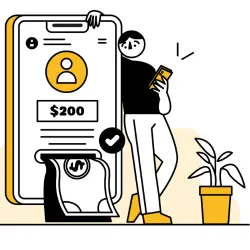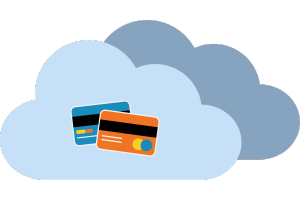TABLE OF CONTENTS

Regardless of your industry or business size, you must offer your customers solid payment options to keep competitive. Cash App vs Zelle has often been debated but never concluded. Over the past decade, numerous mobile payment apps have emerged to meet convenience and speed demands. Cash App and Zelle have risen notably in this regard.
However, these two tools can cater to different markets at times. Choosing the right fit for your business is vital to help you increase revenue, improve customer satisfaction, streamline cash flow, and reduce costs. In this guide, we compare Cash App and Zelle’s features and consider the pros and cons of each option so you can decide between Cash App, Zelle, or another alternative.
An Overview of Cash App vs Zelle for Business Use
Cash App and Zelle initially launched as P2P mobile payment services before expanding for business use. That’s about where the similarities end. With different institutional structures, fees, and payment methods, not all businesses will benefit equally from each service.

The Functionality of Cash App for Business
Cash App launched its P2P mobile payment platform in 2013. In 2015, It expanded the service to businesses with Cash for Business, offering a convenient way to receive customer payments.
Cash App enables businesses to receive customer payments via debit and credit card. The platform supports Mastercard, Visa, Discover, American Express, and select prepaid cards. You can accept in-person or remote payments via QR code, or customers can pay via a shareable URL.
When opening a Cash for Business account, you’ll create a unique username called a $Cashtag. This $Cashtag helps customers find your business quickly on the app; alternatively, clients can initiate payments to your account by entering your email or phone number.
Cash for Business further simplifies payments for service providers and freelancers by allowing you to send clients a payment request with a note. All the client needs to do is respond to the request by confirming the transaction. This helps curtail the chance of clients accidentally using incorrect payment details.
Once a customer pays you, the funds appear in your Cash for Business balance. You can spend it directly or transfer funds to your linked bank account. All transactions will appear in your app activity feed. Cash App also conveniently offers a refund feature for business customers.
During tax season, CashApp provides business owners with a 1099-K tax form detailing the commercial income received through the app, which exceeds $600 annually. This includes transparency regarding business income and simplifies income tracking and reporting for your business.
CashApp may be an attractive option as it provides unlimited, contactless customer payments and instant deposits for fast access to funds. The account setup is simple; there’s no charge to register a business account, and tax documentation and filing are streamlined.
Drawbacks with Cash for Business
Be sure you understand the following:
- Once authorized, payments cannot be canceled
- High-risk industries cannot use the service
- No international payments
- Businesses need to provide receipts for transactions over $15
- Customers must be given the option to sign for purchases over $25
- If Cash App suspects suspicious behavior, it holds the right to withhold funds or freeze accounts without warning

A Look at Zelle for Business
Zelle for Business enables businesses to send, request, and receive money directly to and from US-based bank accounts. It’s designed to be simple, fast, and secure for companies to manage transactions without needing cash, checks, or credit card processing.
First, check that your bank or credit union offers Zelle business services to use Zelle for Business. If it does, enroll your business bank account with the service through your financial institution’s online or mobile banking platform.
When you need to pay a vendor or an individual, access Zelle through your bank app. Select the recipient from your contacts (or enter the recipient’s email address or mobile phone number), enter the payment amount, and send the funds.
To receive payments, share the email address or mobile phone number linked to your bank account with your customer. Customers can then use Zelle to send money directly to your business’s bank account.
Businesses can also request payments from clients through Zelle. The request is sent to the client’s email address or phone number, after which they can review and approve the payment for direct deposit into the business’s bank account.
One of Zelle for Business’s main benefits is its speed. Transactions typically occur within minutes between enrolled users. The exact timing may, however, vary by bank. Users can enjoy near-instant contactless payments straight to their bank accounts. Additionally, most network banks do not charge Zelle transaction fees.
There are still some drawbacks to consider:
- The platform does not support credit card payments
- No purchase protection
- Zelle does not facilitate returns
- Zelle does not support international transactions
- Senders and recipients must be enrolled with Zelle through their bank
- Not all in-network banks offer business accounts
- No tax documentation is provided
Assessing The Features and Services of Both Platforms
When comparing Cash App or ‘Cash for Business’ vs. Zelle’s features, determine your business needs first. This will allow you to choose the best solution that matches your practical business requirements, not just what looks good on paper.

Cash for Business vs Zelle Business Transactions Limits
Cash for Business does not limit the amount of incoming payments you can receive—only how much you send. Verifying your business account to maximize Cash App limits allows you to send up to $7,500 daily and $17,500 weekly. These limits reset at 7 PM Central Time. The monthly outgoing payment limit is $25,000 and resets at 7 PM CT on the last day of the month.

Since Zelle transactions go straight to your bank account, limits are set individually by each banking institution. Transaction limits can vary significantly depending on who you bank with. Banks don’t usually cap the receiving amount—but will often limit the sending amount and the number of transactions.
Confirm with your bank what their Zelle limits for businesses are. You can consider the following as a general guideline:
Zelle Daily Sending Limits
- Bank of America: $15,000 or 20 transactions
- Chase Business: $5,000
- Wells Fargo: $3,500 (Wells Fargo also imposes a $10,000 daily receiving limit)
- Capital One: $2,500
- Discover: $600
- Citizens Bank: $1,000
Zelle Monthly Sending Limits
- Bank of America: $60,000 or 120 transactions
- Chase Business $40,000
- Wells Fargo $20,000

Fees and Costs
Neither Cash for Business nor Zelle charges an account set-up fee. With Cash for Business, you pay a set percentage for transactions as they occur; these transaction fees are not refundable but are tax-deductible. Cash for Business charges businesses 2.75% of the transaction amount when accepting payments, automatically deducted before the payment reaches your account.
Unlike other mobile payment platforms, instant deposits to your linked account are free with Cash for Business. This gives you fast access to funds and eliminates cash flow issues.
Meanwhile, Zelle does not charge transaction fees whatsoever. However, while Zelle is generally accessible, its features are limited. Since Zelle does not accommodate credit card payments, you may lose customers along the way—a potentially more significant loss than a small transaction fee. Zelle might be better offered as a supplementary payment option than the only solution.
Also, even though the platform does not charge, some banks may charge a small fee for Zelle services. Confirm with your banking institution that it is free for business.

Security and Fraud Protection
Cash App and Zelle security and privacy standards are relatively similar in that both platforms employ encryption, strict access control, and two-factor authentication (2FA). Both platforms allow customers to make payments using an email address, which protects your account details and personal information.
However, since Zelle transactions move directly between bank accounts, Zelle assumes that the financial institution takes on fraud protection responsibilities. Whether a payment was accidentally made to the wrong person or a user was scammed, Zelle offers no recourse. You will likely have to take the situation up with your bank.
Cash for Business does implement measures to detect and block fraudulent activities—but this does not mean security breaches won’t happen. The platform offers protection against unauthorized transactions and will try to assist you if you’ve been a victim of fraud. However, they don’t guarantee to retrieve money if you get scammed. To help you stay vigilant about account activity, Cash for Business offers push, text, and email notifications for account activities.
Cash Card is a Visa debit card that can be used to pay for goods and services from your Cash App balance, both online and in stores. Its customers in the US have deposit protection up to $250,000 by the FDIC. Cash App also has PCI-DSS level 1 certification to secure CashApp debit card payments and is a member of the Financial Industry Regulation Authority (FINRA).

Customer Support Services
Zelle does not have a good reputation for customer support services. If you are enrolled with Zelle through your bank, Zelle will generally tell you to contact your bank regarding any problems. Of course, if you are enrolled through the Zelle app, you can contact Zelle directly by phone to deactivate your account. You can use the same helpline number for other queries or to complete the query form on their online support page. In this case, they should respond via email within two business days. Zelle’s support center operates between 10 AM and 10 PM Eastern Time (excluding bank holidays).
Meanwhile, Cash for Business offers multiple ways to contact their support agents. The most straightforward option is right from your app. After logging in, tap the profile icon and select “Support.” Then select the “Send a message” or “Start a chat” option to connect with an agent. If you prefer to speak to someone over the phone, the support center takes calls between 9 AM and 7 PM Eastern Time on weekdays.
You can also connect with Cash App customer agents via social media channels, including Instagram, Twitch, X, TikTok, Reddit, and Facebook. However, this is not always the most efficient or safest option for businesses.
As always, be wary of scammers when using out-of-app help services. Cash App support agents will never ask for your password, SSN, PIN, sign-on code, or full card number, and they will never request that you complete a test transaction via phone or social media.

Transfers and Payment Speeds
Cash App is faster than other payment apps such as Venmo and PayPal. Funds are generally deposited between Cash App accounts within minutes. Standard transfers from your Cash for Business account to your bank account can take up to three days. However, the platform allows business account holders to process instant deposits at no extra cost. Private account holders incur a fee to fast-track bank transfers.
Meanwhile, Zelle does not hold funds in a digital wallet, unlike most competitor platforms. This means transfers are nearly instantly directed to your bank account. Fund access delays are eliminated since transferring funds between a digital wallet and your bank is unnecessary.

Ease of Use and Accessibility
Zelle is already integrated into many banking apps, saving users the hassle of downloading additional apps. Users can easily switch between their personal and business accounts and keep track of finances with a single login. Although this is convenient, its lack of features makes it extremely limited. For example, since Zelle does not provide any tax records for business account holders, you’ll have to track business transactions manually and prepare your tax documents.
Cash for Business has a user-friendly interface that is easy to navigate, perform transactions, and track account activity. It offers more features than Zelle, yet it is still straightforward and can nicely fit freelancers and small to medium businesses. Cash App provides tax documentation for business account users, simplifying tax filing. In addition, you can integrate the platform with accounting software.
Cash App or Zelle: Making the Right Choice for Your Business
Before choosing a payment platform for your business, consider your priorities. Will transaction limits restrict your business operations? Do you need a platform that supports a high-risk industry? Will your operation be hampered if your provider suddenly suspends your account without notice?
Neither Cash for Business nor Zelle supports high-risk businesses, and both platforms will suspend user accounts if they suspect unusual activity. In addition, neither of these services allows you to conduct international payments, which can limit business growth.
PaymentCloud is here to fill the gap. As a credit card processing provider aiming to support your unique business entirely, we don’t believe in one-size-fits-all solutions. Our services support almost every industry type and cater to high-risk sectors, ensuring you have the peace of mind needed to grow your business.
FAQs
Which Is Better for Businesses, Cash App or Zelle?
Zelle can help you save on transaction fees. However, you should consider whether its limited payment methods won’t cost your customers. Cash for Business, on the other hand, offers a variety of payment methods, but these come at a cost. There are also many other alternatives to consider. The best platform for you will depend on your business needs and the services you offer.
Can You Use the Cash App Card on Zelle?
Since Cash App is not a bank, you cannot use your Cash Card with Zelle. You can, however, use your linked bank account on Zelle if you bank with a Zelle partner bank.
Can I Use Cash App Without a Bank Account?
You can use Cash App without linking it to a bank account. You can deposit paychecks, cash, or tax returns to your Cash App balance and spend it directly.
Can You Send Money From Cash App to Zelle?
No, users cannot transfer money directly between Cash App and Zelle. However, you can link your bank account to Zelle and Cash App and transfer money between the two.





